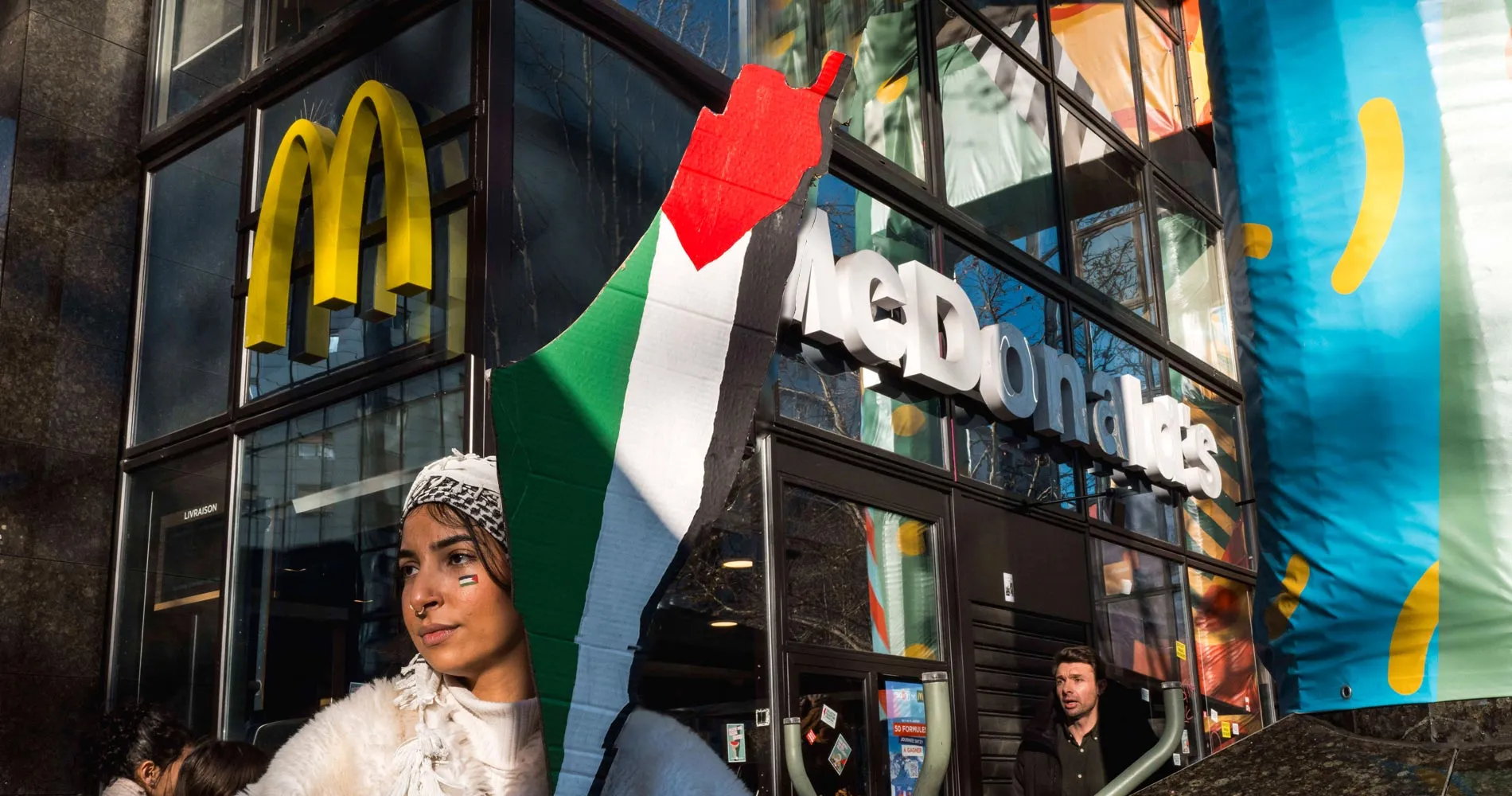The BDS (Boycott, Divestment, and Sanctions) movement has gained traction and worldwide attention for its plea to boycott Israeli goods until the Jewish state abides by international law. The primary impact of such measures is hitting US brands. Although the nonviolent BDS protest has increased the pressure on Israel and those countries supporting and arming the Jewish State, Israel continues its attempts to counter the BDS movement by instrumentalizing law and weaponizing antisemitism.
Murat Gibadyuko
7 February 2024
Chinese version | German version | Spanish version
Founded in 2005 by Palestinian academics, refugee networks, women’s organizations, professional associations, and various other Palestinian civil society entities, the BDS movement draws inspiration from the anti-apartheid movement in South Africa. According to BDS, it stands as a nonviolent means to advocate for justice, equality, and the rights of Palestinian refugees.
The Palestinian BDS appeal calls for nonviolent pressure on Israel until it complies with international law, addressing three key demands. Firstly, the cessation of Israel’s occupation and colonization of all Arab lands, including the dismantling of the wall. In 2004, the International Court of Justice ruled the wall to be in violation of international law. International law recognizes the West Bank, East Jerusalem, Gaza, and the Syrian Golan Heights as occupied by Israel.
Within the areas of its military occupation, Israel engages in land appropriation, confining Palestinians to ghettos surrounded by checkpoints, settlements, watchtowers, and an illicit apartheid wall. Gaza has been subjected to a medieval siege, transforming it into the world’s largest open-air prison. Israel’s large-scale assaults on Gaza are widely condemned as war crimes and crimes against humanity. The ICJ has recently accepted an application by South Africa and ordered Israel to prevent genocide in Gaza.
Secondly, the BDS movement advocates for acknowledging and safeguarding of the fundamental rights and full equality of Arab-Palestinian citizens of Israel. One-fifth of Israel’s population is made up of Palestinians who remained within the armistice lines post-1948. They face a system of racial discrimination ingrained in over 50 laws impacting every part of their lives. The Israeli government persistently displaces Palestinian communities in Israel from their lands, with leaders openly inciting racial violence against them.
Lastly, UN Resolution 194 calls for the recognition, protection, and promotion of the rights of Palestinian refugees to return to their homes and properties. Since Israel’s violent inception in 1948, achieved through the ethnic cleansing of more than half of Palestine’s indigenous population – the Nakba, Israel has sought to expand its control over more Palestinian land by displacing more Palestinians and allowing illegal settlements. Over 7.25 million Palestinian refugees now exist because of Israel’s systematic forced displacement. These refugees are deprived of their right to return solely based on their non-Jewish Arab identity.
Since the eruption of the latest chapter in the Israeli-Palestinian conflict at the end of 2023, the world has become deeply divided between supporters and opponents of Israel and its allies. The government of Malaysia has recently implemented a ban on Israeli ships and vessels displaying the Israeli flag from entering its ports. Furthermore, any ships destined for Israel are prohibited from loading cargo in Malaysian ports. According to the Malaysian Prime Minister, Anwar Ibrahim, the ban is a direct response to Israel’s actions, perceived in Malaysia as a violation of basic humanitarian principles and international law owing to its ongoing massacres and atrocities against the Palestinian people.
A new app called “No Thanks” was recently introduced to the world, allowing users to assess a product’s support for Israel by scanning barcodes or entering product names (https://play.google.com/store/apps/details?id=com.bashsoftware.boycott&pli=1). Users were provided information about a product’s stance on Israel, often leading to a “No Thanks” recommendation, discouraging purchases of certain items.
The app was deplatformed by Google for displaying a sentence on its home screen that implied products could be linked to the killing of children in Palestine. This statement sparked a debate about whether this was a valid critique of Israel’s policies in Gaza or whether it was antisemitic. The app’s creator, Ahmed Bashbash, has managed to reinstate “No Thanks” on Google play and other popular app stores. He emphasizes that all profits generated from the app are directed towards Palestinian organizations providing aid in Gaza.
The Israeli government and its affiliated NGOs and operatives have launched a transnational strategy to suppress BDS through instrumentalizing law and weaponizing antisemitism. Included in this strategy is the push to have anti-boycott laws passed. On 10 January 2024, the UK became the latest country to pass an anti-boycott law. This new law will prohibit government agencies from boycotting Israeli goods or services. The new law will take effect after approval in the upper house. This law was applauded by Netanyahu’s cabinet.
US companies have suffered the greatest losses from the ongoing boycotts. So far 37 states have implemented anti-BDS laws aimed at countering the BDS movement. Additionally, many US states have anti-boycott laws or policies that extend to individuals and companies entering into business contracts with states. These laws and policies require contracting parties to declare that they will not participate in any boycott activities.
After the surprise Hamas attack, Representatives of Israeli McDonald’s announced in October 2023 that they had provided thousands of free meals to Israeli soldiers. The revelation that IDF soldiers consume hamburgers and fries while Palestinians in the Gaza Strip lack access to even the most basic food, potable water and electricity has sparked widespread outrage in the Middle East, leading to mass boycotts of US companies. McDonald’s CEO Chris Kempczinski said the restaurant chain is experiencing a “meaningful” hit to its business. Dozens of other US brands are also being shut down in the Muslim world.
The global surge in economic boycotts, spearheaded by the BDS movement, reflects a growing international call to pressure Israel into complying with international law in the Israeli-Palestinian conflict. While it is unlikely that the legislative anti-boycott laws will change public opinion in favor of Israel, suppressing BDS campaigns is at odds with the rule of law, freedom of speech and the essence of democracy.







